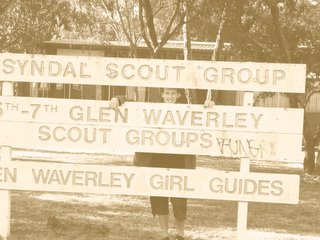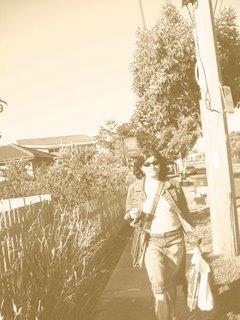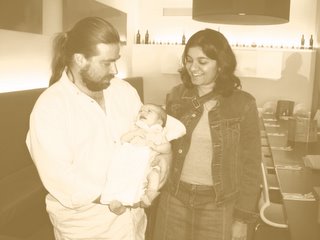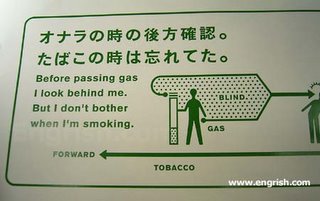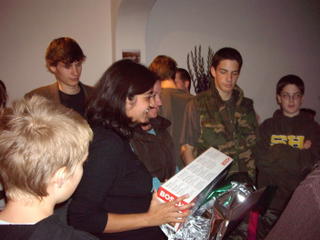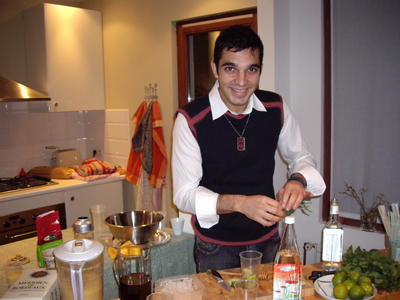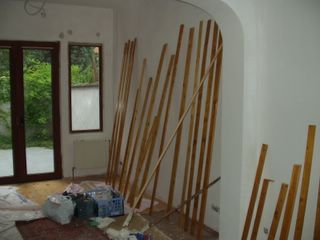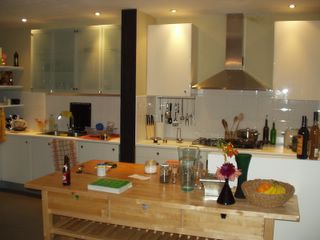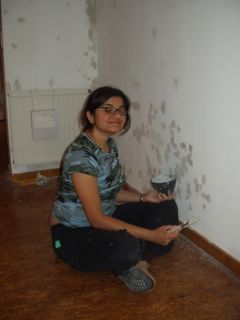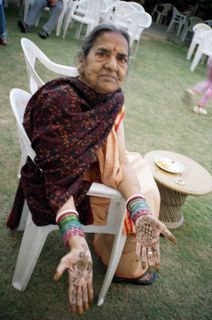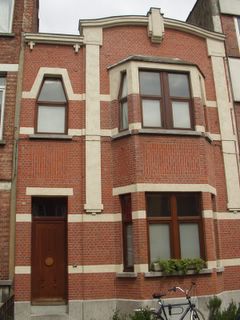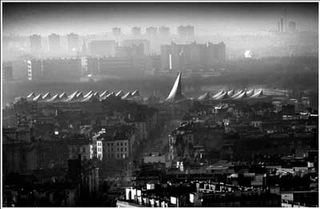This update is from an Australian friend Andrew, who now works for the same NGO I worked for in Afghanistan. Makes me think of our time in Kabul, the same frustrations, practical challenges with the food, weather, social relations, as well as the mess within IRC. It also makes me think of an article I read soemtime ago about NGO workers and neo-colonialism...
Alive, but on what planet?
Well where to start?
I arrived in Chad last Friday at 4am after a couple of days in Ethiopia and was promptly bundled onto a UN flight to Abeche, a small town in the North-East (well I thought it was small, if only I knew where I was going to end up!). After dodging the police at the airport I arrived sleepless and filthy at the IRC office.
The best way to describe this part of Chad is hot, and dry. Coming in on the plane a landscape of sand stretched away to the horizon, occasionally broken by small rugged hills and small trees growing along wadis and dry river beds. The town of Abeche is the base for the NGOs working with Sudanese refugees, based in several camps, just across the border from the region of Darfur, where they have been forced out by the Janjaweed and Sudanese military. Its not much to look at - no paved roads just dirt/sand, and lots and lots of dust, kicked up by 4wds, pickups and motorbikes. At night the headlights make it look like you are walking through a cloud of mist. I hate to think how much african dirt is coating my lungs already. The houses are
mudbrick, generally with tin roofs, the front of the house or a wall surrounding a compound facing the streets. I'm not sure how often the electricity works, but the water for the lovely cold showers (that was sarcastic by the way) is on before 7am and after about 8pm. Not that you can
sleep after 7 anyway, as the heat gets you up a lot before then. And most people sleep outside, at this time of the year there are no mosquitoes. The second night I pulled my mattress outside to enjoy the cool breeze.
Actually I quite enjoyed Abeche. I spent the weekend there - drinks at a bar at the French military base - and the rest of the weekend with one of the local guys Abdul Raman - cruising around on his motor bike seeing the town (well until it got a puncture, then we were pushing it), and on sunday I spent the day with him and his wife, and their friends, eating, chatting and
playing cards. The Sudanese I have met in general are well educated, speak a couple of languages and have a great sense of humour. I felt quite at peace in the evening, when the sun had gone down and the temperature dropped, sitting drinking tea under the carpet of stars, listening to Sudanese music and chatting.
Then on Monday morning loaded down with supplies for the office, I was off to my final destination Bahai. The land beneath the plane steadily got dryer and dryer, I was near the edge of the Sahara now. I probably should have jumped back on the plane when it landed at the 'airport'. This consisted of a long strip of flat sand/dirt, a small shelter made of tree branches and
cloth shredded by the wind, and a small metal sign weathered by sandstorms with a lovely collection of dried bones underneath it. The sign might as well have said 'Welcome to the middle of nowhere'. And Bahai, the 'town'. It is just a collection of scattered buildings, without even dirt roads in between, just tracks on the sand from IRC and UNHCR's 4wds. In the middle, I
guess what could be considered the centre, Libyans and locals park their battered trucks and set up a market in the sand. Supposedly there is something like a bar somewhere, and the brothel is supposed to sell the most expensive beer in the world at 6USD/bottle, the other brothel services are probably cheaper. Small kids, donkeys and goats wander around in the sand and suprising amount of rubbish that accumulates wherever the wind is trapped. The profuse black plastic bag decorates the few trees like flowers.
The IRC 'office' is walled compound with a couple of sparse buildings around its edges and an open sandpit for the rest of it. There is no running water, no food, and only power when the generator is turned on. The housing compound, a couple of minutes drive from the office, looks a bit like some outback-desert motel, the kind that you would drive into and then drive straight out the other side without stopping. Like the office, the centre is dirt, at least this is relatively hard-packed. And there are rows of rooms, like a motel around the walls. Like the office there is no running water, just a couple of tanks that have been sterilized. Showering, or the new verb
I have introduced - bucketing - involves taking a bucket, filling it up from one of the tanks, getting a few scoops of hot water from a pot heating on a camp fire, and then washing off in the mudbrick room, conveniently located next to the long drop toilet, so you can enjoy the pleasant aroma while bucketing off. Well I don't mind all of that, it was the food that got me worried. Even in Abeche, fresh food is quite limited, and here it is even more the case, well there is no fresh food. I am applying the policy of eat first, ask later. Lunch today and yesterday consisted of some unidentifiable meat in broth with rice or pasta, and canned vegetables (carried over as
left-overs to dinner). Considering the only animals I have seen are goats, camels and donkeys I had a pretty good idea where the meat was coming from, although I hate to think of the hygene conditions where it was slaughtered and purchased. So I am happy to say that today I had my first camel pasta, ah it wasn't that bad. Better than the raw meat dish I had in Ethiopia on
the way here. So thats the living conditions, pretty sparse I must say. Probably the best
way to think about it, is to imagine that you are camping out in some sand dunes, then add some donkeys and goats, small black children, some guys wandering around on camels, 15,000 refugees and a small african military, and you doing whatever your current job is. Well at least there is internet at the office, I have a laptop (until the sand kills it) and a satellite phone. And some local ladies wash our clothes, although I put all of mine out for them today, and they seem to have disappeared, hmmm. So it could be worse, I could be one of the refugees, it really sucks for them.
I realise that this email is getting long, but I wanted to write about my work as well. And its not like there is much else to do here at night anyway. My job title is protection manager. I am responsible for the security and human rights of the 15,000 refugees who are based in a camp
about 30 mins drive from here. Its a pretty huge place, a tent village really, in the middle of a flat sandy plain. I have 3 staff who I manage directly - one of whom is responsible for community patrol teams, one for community services and another for information officers and registration of refugees. All in all that's about 100 people. So what I have to do is monitor what is happening in the camp in terms of violence, sexual abuse and exploitation etc etc and then work with the UNHCR and Chadian security forces to address it. Although as for the latter I am responsible for keeping the army and police out of the camp as well - not so easy considering it doesn't have any walls. Add on to that trying to prevent violence and abuse against women, and ensuring the protection of children (it seems I will be managing a guy who just got employed to look at this too) and I have a pretty full plate. Oh yeah and I am supposed to make sure that the relations with the Chadian community don't create any security problems, and at some stage look into gathering testimonials for any international tribunals or human rights mechanisms that need them. It is somewhat difficult because the person who was doing my job previously, left
several months ago, and it seems bugger all has happened since then.
Actually it seems in general that things are a bit disorganised, but I am still forming my impressions of that. The positive part is that I have a lot of responsibility, and can pretty much develop the program as I see fit. The negative - well like I said its disorganised, the living conditions are dismal, and I'm not sure how much support I will get. And the social interactions look pretty strange - I guess working and living with a small multi-cultural group of people in such an intense and difficult environment makes it hard. Well I like the guy that I am sharing a room with temporarily - a heavy drinking sudanese guy called Montasa.
So that is life, from this desolate corner of the planet. Of course there is so much more to write in terms of impression and feelings about country, but I think that is enough for the moment. Overall I am feeling okay, relatively comfortable about the work I will be doing, although my feelings fluctuate a lot, and I feel very very far away from the world and all of you. Its the
kind of place that would be easy to get depressed in, so I am going to stay positive and busy, and try to come up with ideas to keep myself entertained. I heard that there are regular camel races near Abeche, where you can gamble and even buy the winning camel - so I will try to get out to them. Maybe I'll even get a camel of my own :o) And I am waiting to experience one of the promised 3-day sandstorms, when everything shuts down. Oh and I am contemplating growing a beard, well it is more growing itself. And finally, every 2 months, the IRC (www.theirc.org if you want to check it out), give me $1000USD to get the hell out of here for some R&R to another country, so I'll make some plans for that.
Okay, I hope that life is treating you well, whatever you are up to and wherever you are. If you email me, I will be able to reply so I look forward to hearing from you, please use this email address for me.
Take care
Andrew
p.s. please feel free to forward this email to anyone I might have missed



